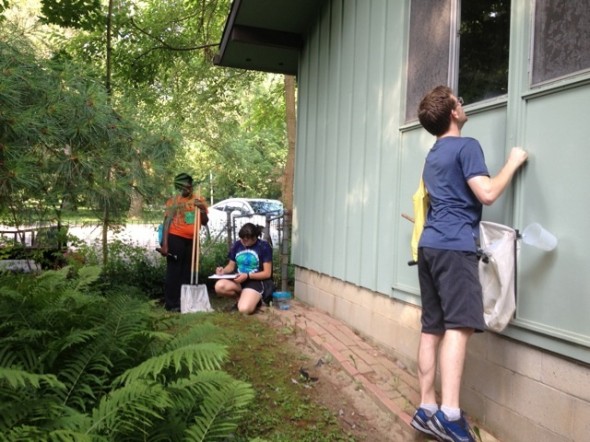Fighting West Nile in the village
- Published: July 28, 2013
Recent rains have created a fertile breeding ground for local mosquitoes, who lay their eggs in standing water. That’s why several local agencies are stepping in to take on the mosquitoes, and the dangerous West Nile Virus that some may carry.
Residents are urged to get rid of standing water on their properties by draining gutters and downspouts, emptying flowerpots and other containers and covering up holes in trees. And they should prevent mosquito bites by wearing insect repellant and donning long sleeves and pants outdoors, especially during dawn and dusk when mosquitoes are most active.
This month Antioch College joined the effort to reduce the populations of Aedes and Culex mosquitoes, the two species that carry West Nile Virus. Antioch assistant professor of biomedical science Savitha Krishna is working with her students to find where in town there are high concentrations of mosquitoes and where they’re breeding.
“[West Nile] is one of the emerging diseases and it has be controlled before it becomes out of hand,” said Krishna, who previously worked as a government entomologist in India fighting the spread of mosquito-borne dengue fever and malaria.
Those who need help identifying and eliminating mosquito breeding sites on their property can email Krishna at snkrishna@antiochcollege.org.
According to the Ohio Department of Health, while 80 percent of those infected with West Nile Virus will show no symptoms, some people can develop a mild fever, headache and muscle aches and about 1 in 150 with develop a severe illness requiring hospitalization. These people may have a high fever, stiff neck, disorientation, coma, tremors, paralysis and may die. Adults over 50, children under 16 and those with existing health problems are at a higher risk for developing severe illness.
Last year there were 121 reported cases of West Nile Virus in Ohio resulting in seven deaths. This week Montgomery County sprayed insecticides at Wegerzyn Gardens in Dayton after the virus was detected in mosquitoes there.
In addition to Antioch, Green Environmental Coalition (GEC), which in the spring successfully pushed Council to forgo the aerial spraying of insecticides, has been promoting ways residents can keep mosquito populations at bay. According to a GEC flyer, residents should:
● Remove or treat any area in your yard that has standing or slow moving water.
● Remove, puncture or drain all water retaining containers in the yard, i.e., cans, buckets, holes in trees, clogged gutters, old tires, birdbaths, flower pots, etc.
● Monitor ponds and water sources regularly for signs of mosquito larva.
● Stock permanent ponds with fish that eat mosquito larvae and pupae.
● Treat home ponds with Mosquito Dunks, which can be bought at local garden stores.
● Maintain window and door screens.
● Use insect repellents and wear long sleeves and pants to prevent bites.
Villagers can also call the Greene County Combined Health District at 937-374-5600 to report a potential breeding site and request the use of larvicide. While the GCCHD will not test for the disease this year due to state and federal funding cuts, they will monitor local mosquito populations and use larvicides when necessary.
Read the full story in the Aug. 1 issue of the News.
The Yellow Springs News encourages respectful discussion of this article.
You must login to post a comment.
Don't have a login? Register for a free YSNews.com account.











No comments yet for this article.